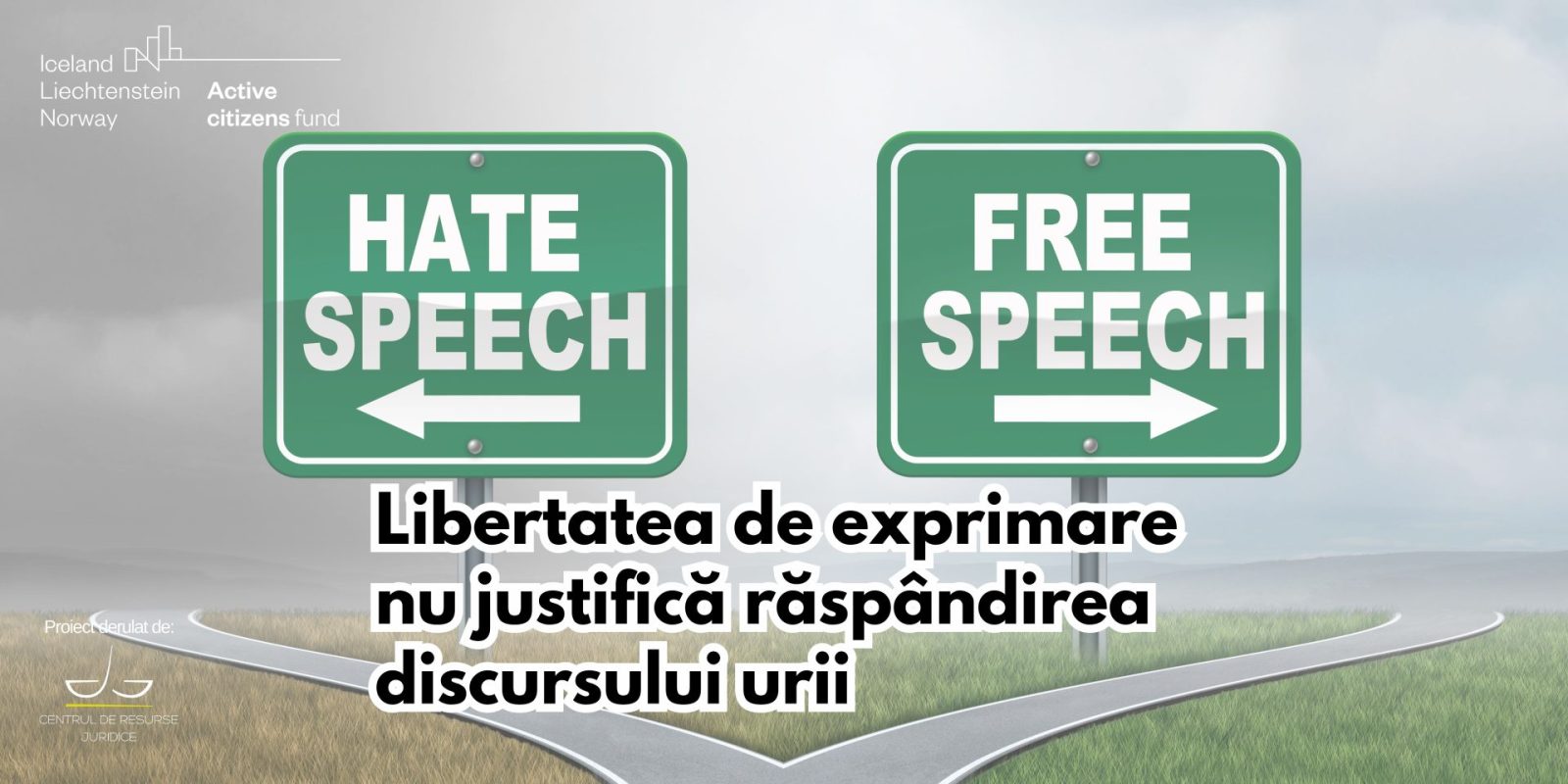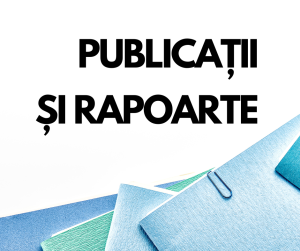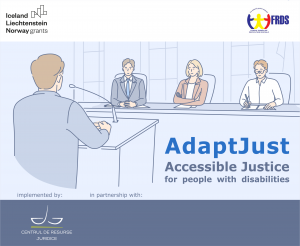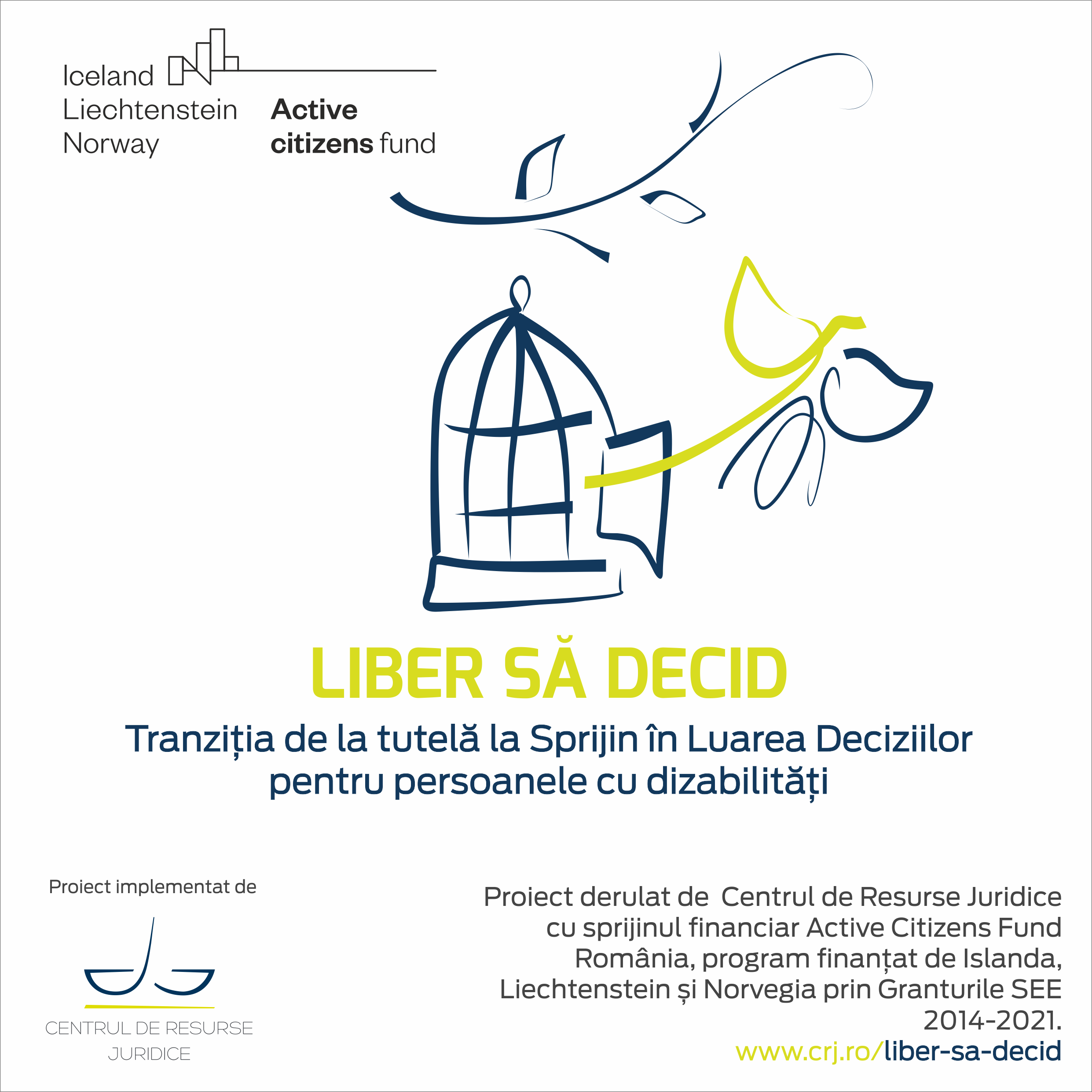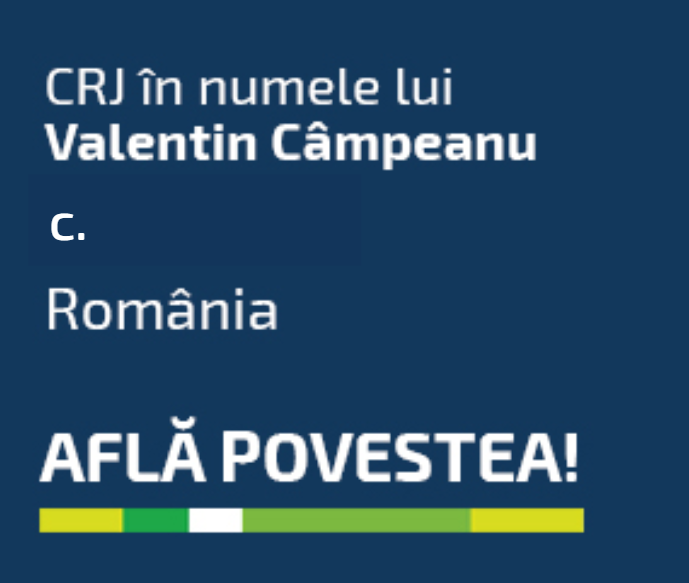Under the broad umbrella of freedom of expression, many people choose to promote ideas of hate speech[1] in the public space. What is worse is that, particularly in recent years, hate speech has also found its way into the rhetoric of some national political parties[2], with the obvious aim of gaining electoral capital.
“You can’t say anything these days!” and “we live in the tyranny of political correctness”[3] are frequently encountered assertions in everyday reality, despite the fact that hate speech and hate crimes continue to be a constant in Romanian[4] and European[5] society.
With this opinion, we aim to contribute to raising awareness that hate speech is not a legitimate form of free speech and that recognizing the limits of the right to free speech is not a form of censorship. In fact, the right to free expression is a fundamental right, but not an absolute one.
- CONTEXT
At the core of any democratic society, the right to free expression is constitutionally enshrined[6] in Romania and is also regulated by the European Convention on Human Rights[7]. However, the exercise of this right entails a number of limitations designed to ensure, on the one hand, a fair balance in relation to the right to respect for private life and the prohibition of discrimination and, on the other, the prohibition of abuses of the law in the form of infringement of the rights or freedoms recognised to other persons.
As will be shown below, the European Court of Human Rights has developed a varied case law on specific forms of hate speech excluded from the protection conferred by the right to free expression.
However, as a preliminary, we consider that some conceptual delimitations are necessary. Thus, although there is no uniform legal definition of hate speech, we consider that the definition provided by the European Committee against Racism and Intolerance (ECRI)[8] is comprehensive, designating the advocacy, promotion or incitement of denigration, hatred or demonisation of a person or a group of persons, as well as the harassment, insult, negative stereotyping, stigmatisation or threatening of one or more such persons, and any justification of all these forms of expression. Thus, a first limitation on freedom of expression can be identified, with hate speech including the justification or apology of hateful behaviour.
In addition, the European Convention on Human Rights expressly provides that the rights and freedoms covered by the Convention may not be interpreted as authorising any state, group or person to engage in any act aimed at the destruction of, or to limit, the rights and freedoms recognised by the Convention other than those provided for in the Convention. In other words, abuse of rights is prohibited.
At the same time, alongside freedom of expression, the European Convention on Human Rights also covers the prohibition of discrimination[9], making it clear that it is necessary to ensure a balance between the values enshrined in the Convention, and not to invoke a Convention right in order to diminish the effectiveness of others.
Thus, the natural steps to educate civil society regarding the identification and rebuke of hate-inciting behaviour and the legal sanctioning of hate speech do not constitute an unjustified interference with freedom of expression, but an exercise in compliance with the provisions of the Convention in its entirety.
In the following, we will illustrate concrete situations in which the ECHR has held the abusive nature of the exercise of the right to free expression, finding the incidence of hate speech.
- EUROPEAN CASE LAW ON HATE SPEECH
· The right to free expression must be exercised responsibly
The ECHR has held[10] that incitement to racial hatred, manifested by an athlete at a football match, by giving messages the content of which expresses or instigates hatred based on race, cannot enjoy the protection conferred by Article 10 of the Convention (freedom of expression). In so deciding, the Court pointed to the need to strike a balance between freedom of expression and the interests of society in promoting tolerance and mutual respect. In addition, it was pointed out that the author of the statements, a famous footballer and a role model for many fans, should have beenaware of the possible negative impact of a provocative slogan on the behaviour of spectators and should have avoided such behaviour.
· Incitement to hatred on the internet, sanctioned by the ECHR
In another case[11], the Court highlighted the danger of the internet in terms of incitement to hatred, in that it offers the possibility for hate speech and incitement to violence to spread worldwide within seconds and sometimes to remain permanently available online. Thus, even content generated online (e.g. social media posts, comments left on news pages) can be a form of hate speech, with both the authors and the entities running the websites in question being liable for the statements in question.
Similarly, in Beizaras and Levickas v. Lithuania[12] it was held that posting hateful comments about photos on the social networking site Facebook, motivated by the fact that the photos portrayed persons from the LGBT community, constituted a clear violation of the provisions of the Convention. Thus, incitement to attack the physical and mental integrity of members of a community vulnerable to discrimination cannot fall within the scope of protection offered by freedom of expression and must be punished.
- PERSPECTIVES
In a press release issued in January 2024[13], Members of the European Parliament underlined the urgent need to criminalise incitement to hate in European legislation, given its alarming increase. The European Parliament’s communication thus mentions a normalisation of hatred at social level, which must be combated by a clear and uniform legislative policy at Member State level.
In this context, it is expected that by the end of the current legislative term, the European Parliament and the Council will extend the list of areas of particularly serious crime with a cross-border dimension covered by Article 83 of the Treaty on the Functioning of the European Union[14] by including hate speech and hate crimes.
- CONCLUSIONS
Like freedom of expression, the dignity of the person and the prohibition of discrimination are fundamental values covered by the European Convention on Human Rights. Thus, the right to freedom of expression cannot be exercised abusively and is not a permission for hate speech[15].
- Although the national legislative framework does not provide a clear definition of hate speech, the forms of manifestation of this behaviour can be identified under special legislation (e.g. G.O. no. 137/2000 on the prevention and sanctioning of all forms of discrimination). For more details, see www.crj.ro/wp- content/uploads/2022/06/Introducere.pdf, accessed on 13.02.2024. In the same sense, see www.crj.ro/wp- content/uploads/2020/09/eMore-country-profile-Romania-website.pdf (in English, accessed 13.02.2024).
- O.C. Gheorghiu, A. Praisler, Hate speech revisited in Romanian political discourse: from the Legion of the Archangel Michael (1927-1941) to AUR (2020-present day), Humanities and Social Sciences Communications volume, 2022.
- www.digi24.ro/opinii/analiza/cand-strica-prea-multa-corectitudine-politica-si-de-ce-ne-razboim-cu-statuile-si-cu-filmele-1321157, accessed 11.02.2024.
- Report on the Situation of Hate Crimes and Hate Speech in Romania in 2021-2022, published by the Centre for Legal Resources in February 2023 and available at www.crj.ro/wp-content/uploads/2023/02/Raport-Infractiuni-motivate-de-ura-2021-2022.pdf.
- www.europarl.europa.eu/news/ro/press-room/20240112IPR16777/time-to- criminalise-hate-speech-and-hate-crime-under-eu-law
- Article 30 of the Romanian Constitution
- Freedom of expression of thought, opinion or belief, and freedom of creative expression of any kind, whether by speech, writing, images, sounds or other means of communication in public, shall be inviolable.
- Censorship of any kind is prohibited.
- Freedom of the press also implies freedom to establish publications.
- No publication may be suppressed.
- The law may impose an obligation on the media to make public the source of funding.
- Freedom of expression may not prejudice the dignity, honour, private life of the person or the right to one’s own image.
- Defamation of country and nation, incitement to war of aggression, national, racial, class or religious hatred, incitement to discrimination, territorial separatism or public violence, as well as obscene manifestations contrary to public decency are prohibited by law.
- Civil liability for information or creation made known to the public shall lie with the publisher or producer, the author, the organizer of the artistic event, the owner of the means of reproduction, the radio or television station, in accordance with the law. Press offences are established by law.
- Article 10 of the European Convention on Human Rights
- Everyone has the right to freedom of expression. This right includes freedom of opinion and freedom to receive or impart information or ideas without interference by public authority and regardless of frontiers. This Article shall not prevent States from subjecting broadcasting, cinematographic or television broadcasting companies to a licensing regime.
- The exercise of these freedoms involving duties and responsibilities may be subject to formalities, conditions, restrictions or penalties prescribed by law which, in a democratic society, constitute necessary measures for national security, territorial integrity or public safety, for the prevention of disorder or crime, for the protection of health, morals, reputation or the rights of others, for preventing the disclosure of confidential information or for safeguarding the authority and impartiality of the judiciary.
- General Policy Recommendation No 15.
- Article 14. Prohibition of discrimination
The enjoyment of the rights and freedoms set forth in this Convention shall be secured without discrimination on any ground such as sex, race, colour, language, religion, political or other opinion, national or social origin, association with a national minority, property, birth or other status.
- Šimunić v. Croatia, http://hudoc.echr.coe.int/eng#{%22itemid%22:[%22002- 12331%22]}.
- Delfi AS v. Estonia, https://hudoc.echr.coe.int/eng?i=003-5110487-6300958.
- Beizaras and Levickas v. Lithuania, https://hudoc.echr.coe.int/eng-press?i=003- 6608238-8764123.
- Press release available in English at www.europarl.europa.eu/news/ro/press- room/20240112IPR16777/time-to-criminalise-hate-speech-and-hate-crime-under-eu-law.
- Currently, these crime areas are: terrorism, trafficking in human beings and sexual exploitation of women and children, illicit drug trafficking, illicit arms trafficking, money laundering, corruption, counterfeiting of means of payment, cybercrime and organised crime. Depending on the developments in crime, the Council may adopt a decision identifying other areas of crime which fulfil the criteria set out in this paragraph. The Council shall decide unanimously, after obtaining the consent of the European Parliament.
- https://www.eesc.europa.eu/en/news-media/news/freedom-expression-not-licence-engage-hate-speech.

